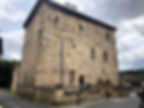Hexham Old Gaol, Northumbria
2 min readA surprising find in a very pretty Northumbrian market town, Hexham Old Goal is the earliest purpose built prison still standing in...
A surprising find in a very pretty Northumbrian market town, Hexham Old Goal is the earliest purpose built prison still standing in England. It was completed in 1333, using stone from the Roman fort at Corbridge and has been through many incarnations before opening as a tourist attraction in 1980.

Hexham Gaol was built on the orders of William Melton, 43rd Archbishop of York, to help him control the lawless border areas between England and Scotland. The region was plagued with bands of robbers, known as the Border Reivers and he needed a solid construction to keep many of these wrong-doers from causing further mayhem.

The dungeon
It’s a small compact building and there are just three floors to see, accessed by a glass lift. The first visit is to the vaulted dungeon – which you can only see it from inside the lift, but you can get a sense of how it must have felt to be locked up here in the cold and dark.
The ground floor has a display about crime and punishment in medieval times, with some good child-friendly comparisons between modern and medieval punishments. There are also some stocks to try out for the adventurous.
There’s information about the area in the 16th century with a list of March Treasons, all punishable offences e.g. marrying a Scots woman! A display case of arms and armour, and a model of the Marches Warden help to set the scene. Upstairs there’s a look at daily life in the medieval and early modern period with an original bastle (defendable farmhouse) window.

The Gaol is an impressive building
Information boards record how Hexham witnessed a severe riot in 1761 when a crowd gathered in the nearby Market Square to protest about changes for serving in the militia. 45 protesters were killed when fired upon by troops in the North Yorkshire Militia. After 1400 prisoners were taken from here on the very short walk to the courtroom of the Moot Hall. This building is one of the best surviving examples of a medieval courthouse, but is only open to the public on special Heritage Days.
The prison closed in 1820 and has subsequently been used as a bank, solicitor’s office and, in WWII, a fire lookout tower. There’s not a lot in the way of artefacts to see, but the building itself is very atmospheric and so worth a visit.



